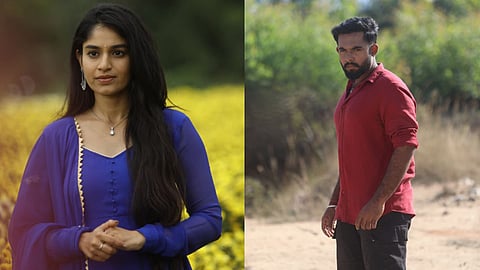Rona Movie Review: Politics, family, and faith collide in rural heartland
Film: Rona Cast Raghu Raja Nanda, Sharath Lohitashwa, Prakruthi Prasad, Bala Rajwadi, Sangeetha Anil, K S Sridhar, and Chillar Manju Director : K Satish Kumar(2.5 / 5)
Village politics offers rich material for cinema, and Rona approaches it with genuine ambition. The film opens in such an atmosphere that feels alive yet burdened by its politics. Director K Satish Kumar sets the stage where tradition, ambition, and family loyalty intertwine. The film attempts to blend politics, religious rituals, and generational clashes into a mass entertainer, weaving father-son relationships with themes of love, friendship, and community responsibility.
Ramakrishna (Sharath Lohitashwa), the village’s moral anchor, stands against an MLA who bends rules for personal gain, ignores public needs, and even encroaches on sacred ground. When threats escalate, Shivu (Raghu Raja Nanda) steps in. In his debut lead role, he impresses in action sequences and holds his own alongside Sharath Lohitashwa. Their dynamic forms the emotional core of the film, showing courage, loyalty, and the energy of youth challenging entrenched village hierarchies.
Kavya (Prakruthi Prasad), Ramakrishna's good friend Hanumanthu's (Raja Balawadi) daughter, arrives with a research project, offering an outsider’s perspective on the village’s political and social dynamics. She observes, questions, and contrasts modern ideals with traditional obligations, though her role could have been explored further. This subplot underscores the generational tension between old customs and emerging perspectives, adding subtle complexity to the narrative.
The festival of Goddess Kalika is both a visual spectacle and a narrative pivot. Songs, dances, and rituals celebrate faith and community, while accidents and mysterious events introduce suspense. The film’s rural setting, largely authentic and immersive, highlights local customs and the moral weight of traditions, making the environment a character in its own right. The reason behind the film’s title, Rona, is contextualised within these cultural and political layers, giving the story a grounded sense of place.
The narrative of Rona suffers from predictability. Political rivalries, familial loyalties, and moral dilemmas follow familiar patterns, and some motivations behind key events feel underdeveloped. Yet the film succeeds in portraying the intersection of politics, family, and faith, giving audiences a relatable emotional core. Humour, friendships, and emotional beats provide balance to the heavier political drama, making the story accessible without being overly complicated.
Performance-wise, Sharath Lohitashwa anchors the story with gravitas, while Raghu Raja Nanda shows promise and energy in both action and emotional sequences. Chillar Manju adds levity, and the supporting cast strengthens the village’s authenticity. Arun Kumar’s cinematography captures the rural landscapes vividly, while Gagan Baderiya’s music complements the film’s mood, especially during festival and ritual sequences.
Rona is an earnest attempt at blending rural politics, family drama, and devotional themes. While it doesn’t go all-out on narrative and occasionally leans on familiar tropes, it offers moments of courage, loyalty, and community devotion. It’s a watchable, heartfelt story of youth, morality, and tradition set against the vibrant, lively world of village life, a film that partially succeeds in weaving its many threads into a cohesive whole.


